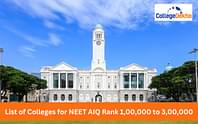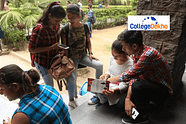
ITI Photographer Syllabus: The syllabus of ITI photographer trade is meticulously designed to provide candidates with comprehensive training, necessary skills and extensive knowledge in photography, thereby preparing them for a successful career in the dynamic and evolving field of visual arts. ITI Photographer Trade Syllabus focuses on developing both the technical and artistic skills necessary to excel as a professional photographer. Students who successfully complete the trade can expect to be employed as an Event photographer (weddings, corporate events, etc.), Videographer/Filmmaker, Photojournalist, Studio photographer, Photography Assistant. Candidates can check this article to know more about the ITI photographer trade syllabus.
ITI Photographer Syllabus: Topics and Concepts
The detailed syllabus of ITI Photographer can be checked from the below table.
Syllabus | Topics | Related Concepts |
|---|---|---|
Trade Theory | Introduction to Photography |
|
Lighting Techniques |
| |
Post-production Techniques |
| |
Portfolio Development and Client Interaction |
| |
Photographic Equipment and Accessories |
| |
Composition and Framing |
| |
Digital Photography |
| |
Photography Styles and Genres |
| |
Image Output and Printing |
| |
Trade Practical | Basic Camera Operations |
|
Practical Photography Sessions |
| |
Practical Lighting Techniques |
| |
Post-production Practical |
| |
Workshop Calculation and Science | Mathematics in Photography |
|
Science in Photography |
| |
Engineering Drawing | - |
|
Employability Skills | Communication Skills |
|
Information Technology (IT) Skills |
| |
Entrepreneurship Development |
|
Structure of ITI Photographer Trade
The distribution of training hours across ITI Photographer trade can be checked here in the below table.
Course Syllabus | National Training Hours |
|---|---|
Trade Practical | 840 |
Trade Theory | 240 |
Employability Skills | 120 |
Total | 1200 |
Assessment for ITI Photographer Trade
Candidates can check in detail about the ITI Photographer trade assessment process from this section.
Assessment Process
The assessment process will be based on internal assessment and final assessment. The process involved is explained in detail below.
- Internal Assessment - It is a form of continuous assessment completely based on the Formative Assessment Method. Here, the training institute will maintain a detailed individual trainee portfolio
- Final Assessment - The final assessment will be in the form of a summative assessment. The final assessment will be conducted by the Controller of examinations, DGT. Before marking the practical examination the individual trainee’s profile will also be assessed
Method of Assessment Criteria
The following evidence will be checked as methods of assessment for ITI Photographer Trade.
- Job Carried out in Labs / Workshops
- Record Book / Daily Diary
- Answer Sheet of Assessment
- Viva-Voce
- Progress Chart
- Attendance and Punctuality
- Assignment
- Project Work
ITI Photographer Trade Marking Scheme
Candidates can follow the below table to learn about the marking scheme for internal assessment.
Grade | Particulars |
|---|---|
60% to 75% |
|
75% to 90% |
|
Above 90% |
|
Pass Regulation
When determining the results, courses lasting six months and a year are given 100% weight. Nonetheless, 50% of the total weight is applied to each exam for courses lasting two years. The minimum passing percentage for Trade Practical and Formative Assessment is 60%; however, the minimum passing percentage for other subjects is 33%.
The syllabus of ITI Photographer Trade allows candidates to have a theoretical understanding of the trade as well as practical knowledge making them proficient in the realm of visual arts. The Photographer trade facilitates technical expertise as well as industry-relevant skills, making students employable in industries like e-commerce and advertising agencies.
To get guidance for admission as a Photographer, feel free to dial our toll-free number 1800-572-9877 or fill out CollegeDekho’s Common Application Form . An admissions counsellor will be assigned to you to make your journey hassle-free. In case of any queries or concerns, you can write to us in the QnA zone .
Are you feeling lost and unsure about what career path to take after completing 12th standard?
Say goodbye to confusion and hello to a bright future!

Was this article helpful?


















Similar Articles
ITI Admission 2025: State-wise Dates, Online Form, Fees, Merit List, Courses and Fees
West Bengal (WBSCVT) ITI Admission 2025: Registration, Merit List, Choice Filling, Seat Allotment, Fees, Trades
List of Top ITI Colleges in Bihar 2025: Private & Government
Bihar ITI Admission 2025: Dates, Eligibility, Application Form, Admission Process, Counselling
ITI Application Form 2025: Dates, Fee, Registration Process, Official Websites
List of Jobs Available After ITI Computer Operator and Programming Assistant Trade: Job Roles, Salary, ROI